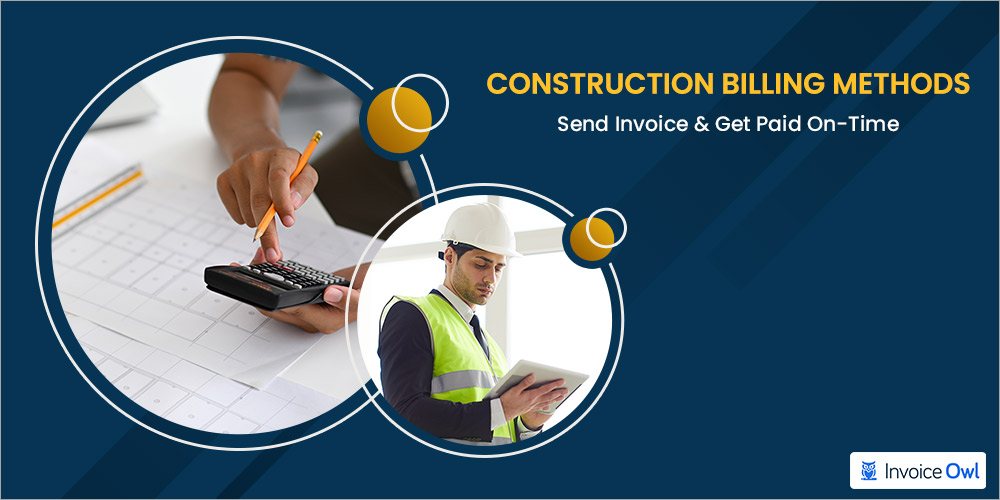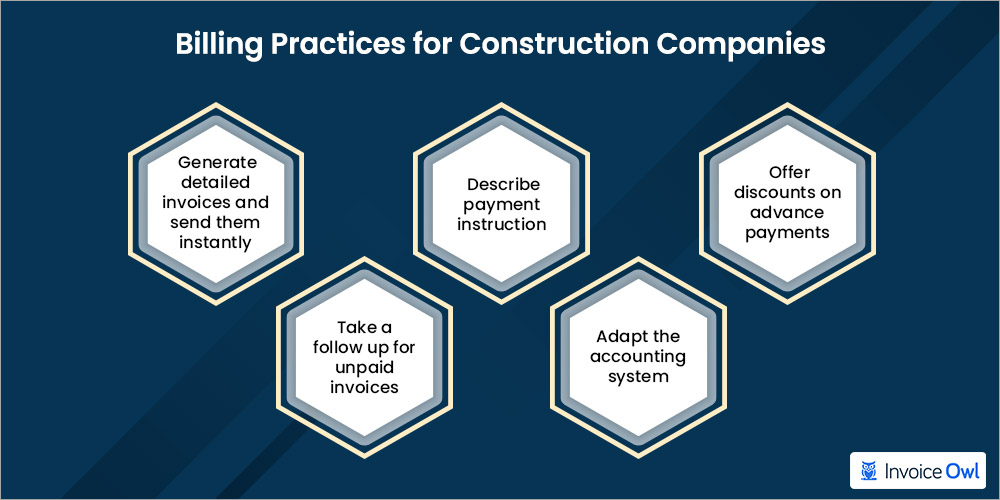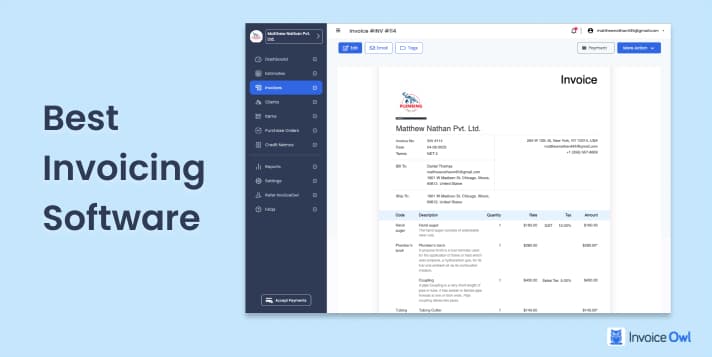
Like every other industry, the construction industry is also back on track post-pandemic. It has accelerated the rate of growth. Plus, there is on-time payment to construction companies or professionals.
According to the National Construction Payment Report 2020, a survey of 540 construction professionals concluded that approximately 50% of construction contract professionals received payments on time.
And one of the reasons behind this is the lack of awareness of the various construction billing methods.
This article is all about letting you know the 7 effective invoicing methods to bill clients. And the construction industry's best billing practices that most successful construction contract companies follow.
Wait no more for cash, get your job done, and receive your hard-earned money on time.
Key Takeaways
- 017 proven construction billing methods to choose from based on your project type and cash flow needs
- 02Best practices for documentation, payment terms, and follow-ups to ensure timely payments
- 03How to reduce payment delays and improve cash flow with the right billing approach
- 04Which billing method works best for different contractor types and project sizes
- 05Digital tools and automation strategies to streamline your construction invoicing process
Understanding Construction Billing Methods
Construction billing can be complex, with various methods used to track project progress and invoice clients. To ensure accurate and timely payments, it's essential to grasp the different billing models employed in the construction industry.
What makes an effective billing method?
A construction billing method is used by construction contractors to notify their clients about the payment that is due for the work.
It also means you bill your clients about the value you are adding by building whatever is demanded. It is also necessary for construction accounting and preparing financial statements. Now that you know what a billing method is, let's look at 7 of the most popular billing methods used in this industry.
Comprehensive Guide to Construction Billing Methods
Below are the different construction billing options that you can use to smoothen your billing process.
Advanced billing method
As the name says, this method demands cash in advance, meaning before the beginning of the construction project. Another name for an advanced billing method is the lump-sum payment method.
As a contractor, you can ask for an advance payment to buy raw materials and pay your subcontractors or vendors. With the help of an advance, you can even complete your project on time to build loyal customers.
Now that you know the good side, let's know the bad side. If the project goes over budget, the contractors (you) have to put money out of your pocket to complete the construction.
The advanced billing method requires payment before starting the work, so it's great for contractors who have worked with clients for the long term. This works best when all is done on time - project completion, invoicing, and payment.
Progress billing method
Just the way you are steadily progressing towards finding the right billing method, this progress billing method tells you to bill your client on every milestone you achieve.
The payments are released on the basis of the project completed to date. Apart from including other information, the important detail you must include is the payment schedule.
It means the division of the project, invoice submission, and payment should be clearly addressed before you shake hands. This method is one of the best billing methods for both construction contractors and clients.
None of the parties are at risk; contractors would never run out of cash, and the client will always have a percentage of work completed.
The billing method also creates a concrete financial statement and keeps the accounts updated.
Arrears billing method
By now, you have seen two different invoicing methods; before the beginning of the project and payment throughout the project.
This one is slightly different since it requires asking for payment at the end of the project. Once the project is completed, the clients release the payments.
From the contractor's point of view, this one is quite risky in two ways:
- You (as a contractor) have to put money out of your pocket for labor and material costs.
- And what if the client rejects the project or denies payment?
Construction businesses with heavy cash flow can opt for this billing method. Plus, the ones who want to win the trust and build long-term relationships. This method works best when the construction project is for a shorter duration.
Fixed price billing method
A lump sum amount paid to the contractor for the entire construction project by the client is the fixed price billing method.
Contractors are entitled to receive incentives for early completion and are charged penalties for exceeding deadlines defined in the contract.
This method works well when the scope is clearly defined and there is no price fluctuation in labor or raw material.
Who can opt for the Fixed Price Billing Method?: Contractors who want to win clients and are financially sound can opt for this billing method.
Time & material billing method
In this billing method, contractors ask for the cost of raw materials and charge on an hourly or on daily basis. The invoicing method allows you to add change orders, and there are no deadlines for it.
The downside of this method is it requires a heavy-documentation process for a time and materials contract. Plus, there is no appreciation for the work completed quickly.
Who can opt for the Time & Material Billing Method?: Contractors with heavy cash flow and a good reputation in the market can opt for this billing method.
Cost plus billing method
As the name suggests, it indicates cost plus the part or percentage of profit. The client has to pay the construction contractor an entire cost to build the project plus a profit percentage. The cost includes:
- Material
- Manpower
- Equipment
- Travel mileage
- Insurance
- Communication expenses
This method is ideal for contractors since they do not have to put money out of their pocket and never run out of money.
Another benefit-cost plus billing method brings to the table is in favor of the contractors; no matter how much the price level increases for material or equipment, the contractors get full payment.
Unit price billing method
This billing method works by dividing the projects into blocks or segments. These blocks remain undefined at the beginning of the project.
Plus, there can be addition, revision, or rework in the project as many times as the client wants.
The major downside of this billing method is contractors are required to provide a lot of documents to justify their payments, and still don't receive remuneration on time.
Who can opt for the Unit Price Billing Method?: It is commonly used by construction companies with repetitive work. However, considering all the hassles involved in this billing method to the contractors, we don't suggest using it.
We hope you have chosen your billing method to streamline the construction billing process and get into that 50% of contractors, who have received payments on time (discussed in the beginning with proven stats).
Now let's look at the best practices to follow to get the payments on time without fail.
Best Practices for Construction Billing Success
Here are some of the best practices that you should consider for your construction projects.

Documentation requirements
Firstly, you should generate invoices by filling in the necessary details such as:
- Net amount depending on fixed rate or unit price contract
- Shipping address
- Contact information
- Available payment modes
Once an invoice is made, you should recheck it for billing errors or spelling errors.
Thereafter, you should send it to your client as quickly as possible. This is because the longer you wait, the longer you have payment delays.
Consequently, you may not have a smooth cash flow in your business. Therefore, we suggest you must send timely invoices to the clients. And the best way to get it quickly is by an online invoice builder.
Payment terms and schedules
Another important note you need to insert at the time of invoice generation is to mention the payment instruction in detail.
However, longer payment instructions may lead to a higher debt ratio, which can be critical for the companies' finance. So you can describe it in a short note at the bottom of the invoice.
It is necessary to clearly outline the important payment guideline for customers to know exactly when you are expecting payment. But do not try to include burdensome terms and conditions along with it.
Build trust and a collaborative relationship with your client so that you can help them on the path toward securing better terms.
Offer discounts on advance payments
In the construction industry, customers will find your construction business profit if you have discounts on your contract price.
Yes, it is the easiest way to get payments faster if you come up with discount schemes for your service. On the other hand, you can introduce charges for the late payers to penalize late payments.
So, if the customer pays after the due date, you can ask them to pay late fees. By introducing these two schemes in the construction contracts, you may have a reduced number of unpaid invoices and more service buyers.
In terms of discounts and late payments, you should inform them about your payment expectation as well.
Take a follow up for unpaid invoices
When you are into the construction business, you might have to be on your toes to follow up on the due payments. This could be the result of the outstanding invoices which have overdue payments.
In such cases, immediately send a reminder to your clients to understand your concern. With InvoiceOwl, you will not have to search unpaid invoices, as you will be notified once the client's payment is due.
Professionals who are running construction businesses take follow up by sending emails or direct phone calls. By taking follow-ups you would be sure of getting paid for what you have worked.
Also, you can talk to the customer about the pending invoice before sending an email. It will be a professional way to contact your clients in case they have due payment.
Digital tools and automation
Mostly, construction companies prefer to use invoicing software where they may not have to enter details manually. Also, it would help them to have a reduced workload.
We recommend professionals from the construction industry use an invoice generator. The automated software designed for the construction project will help you choose a suitable template as per your requirement.
With InvoiceOwl, your billing process will not be time-consuming and you will fewer errors when you have e-invoices.
Moreover, it would be easier to save records of paid and unpaid transactions, which will help you at the time of tax reporting.
Ready to Streamline Your Construction Billing?
Join 100,000+ contractors using InvoiceOwl to create professional invoices and get paid faster.
Start Your FREE TrialFrequently Asked Questions
There is no deadline to send the construction invoices. But, the contractor must start creating invoices as soon as they start their new project. Once the project is done they should immediately send invoices to the clients so that they can pay you on time. Also, you can send invoices while the work is being done and request the client for advance payment.
An invoice can be both a purchase invoice and a sales invoice if the invoice is generated by a neutral third party to acknowledge the transaction.
Sure. Try these free Construction invoice templates for your business. It saves you time to create a professional invoice as you won't have to design it from scratch. With these, all you have to do is fill in the invoice details for your services and calculate the payment amount.
The standard payment terms illustrated on the sample construction invoice template help customers know when exactly the contractor is expecting payment and what will be the consequences if they don't pay the total cost on time or at the payment due date. In the future, a contractor can modify the standard payment terms as per the client's construction agreement before issuing the invoices.
Below are the essential details you need to enter while creating an invoice: Business name and logo, Billing name and contact details, Shipping address, Product quantity and description, Payment note, Contract price and the net amount, Invoice number and due date, and Payment options.
Conclusion
We understood how construction invoice helps contractors to create invoices by adding essential information related to work completed and materials used. By using construction invoice templates in your business, you can easily:
- Generate professionally-looking invoices
- Send invoices quickly to the customers
- Constant follow-ups to get paid on time
- Improve your business efficiency
Also, we learned the best practices that you can apply and make your work easier.
On the ending note, it is better to adopt contractor estimate and invoice software like InvoiceOwl which is the complete invoicing solution that helps you with not just creating invoices, but also managing and tracking them.


![Construction Invoice Factoring [All-in-One Guide]](/images/2022/06/construction-invoice-factoring.jpg)